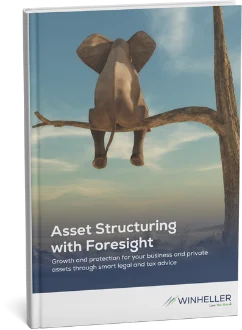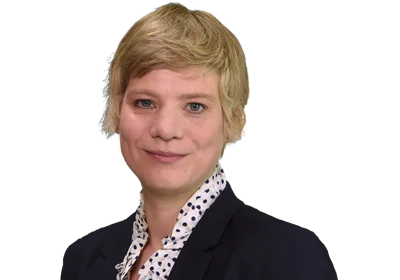Trusts in succession planning in Germany
Succession planning with common law trusts: Note special tax features
Trusts are an integral part of succession planning throughout the common law jurisdiction and are commonly used in many forms. The term "trust" describes a trusteeship agreement between a settlor who assigns a portion of his assets to a trustee (often a bank or law firm) who holds, manages and pays out those assets for the benefit of a beneficiary. It is also possible that the settlor and the trustee or beneficiary are the same person.

Trusts offer attractive options for succession planning
A trust offers many tax advantages in common law legislations (particularly in the US and UK) as well as the opportunity to keep family assets together, allow them to increase and sustainably provide for the family for several generations.
Civil law feature: Division of ownership
The special feature of the trust is the separation of ownership of the trust assets, which is unknown in German law. Although the trustee usually becomes the fully entitled (full) owner of the assets assigned to him (so-called trust property), the exercise of ownership is, nevertheless, limited by the (ownership) rights of the beneficiaries according to equitable principles (so-called equitable ownership). This leads to difficulties in the classification of the trust in the German civil law system. The contribution of assets located in Germany or German partnership interests in a trust is therefore a challenge, if not impossible.
However, with appropriate configuration, these problems can be partially circumvented.
When is German tax law relevant?
From the standpoint of German tax law, the question of taxation always becomes relevant when
- a taxable person in Germany establishes a (foreign) trust,
- the (foreign) trust is or will be endowed with assets located in Germany or
- beneficiaries of the trust are subject to taxation in Germany.
Depending on the individual case, a large number of tax types can be addressed, e.g inheritance and gift tax, income tax, land transfer tax etc. Since, from a German legal standpoint, the trust constitutes a "foreign body", it has specific features in almost all tax types which need to be recognised and considered.
Taxation in Germany depends on the trust structure
Whether and how exactly these procedures are then subject to German tax law is a question of the individual case and depends, to a large extent, on the structure of the trust. A variety of criteria must be considered in classifying the trust for tax purposes, such as who is a beneficiary and at what point in time and whether the settlor of the trust has reserved revocation rights and/or extensive management rights and powers of disposition.
Transparent and non-transparent trusts
In this respect, a distinction is often made between "transparent" and "non-transparent" trusts. This refers to the nature of the trust as an independent or dependent entity and, consequently, the tax-relevant economic attribution of the assets of the trust to the trust itself or to the settlor or the beneficiaries.
Transparent trusts non-existent for tax purposes
In a "transparent" trust, there is no transfer of assets to the trust from a tax perspective. For tax purposes, the assets of the trust are still attributable to the settlor or already attributable to the beneficiaries of the trust. For German inheritance and gift tax purposes, this means that taxation only occurs to the extent that the creation of the trust constitutes a bequest or donation to beneficiaries resident in Germany. From an income tax perspective, it is not the trust itself that directly generates the income but rather the beneficiaries. A "transparent" trust is treated as non-existent for tax purposes.
Non-transparent trust may be taxable in Germany
In contrast, the "non-transparent" trust is treated as a separate taxable entity. Assets assigned to a "non-transparent" trust are tied up with the trust and are directly attributed to it for tax purposes. In practice, the establishment of a common law trust is usually carried out by persons residing in the USA or Great Britain. Since the trust is also usually domiciled in the USA or Great Britain, the establishment of a trust is only subject to German inheritance or gift tax if assets located in Germany are involved. However, if distributions or payments from the trust assets are made to beneficiaries residing in Germany, a tax liability in Germany is regularly issued.
If the trust is "non-transparent", i.e. a separate taxable entity, it generates the taxable income from the investment of the trust assets (e.g. interest, dividends and capital gains) itself. The income is often not directly subject to German income tax as trusts only rarely establish their domicile or management in Germany. However, this principle can be suspended by the so-called Controlled Foreign Corporation provision according to § 15 of the German Foreign Transaction Tax Act, whereby the income of foreign asset pools is attributed to the beneficiary residing in Germany as personal income under certain conditions.
Our consulting services for succession planning with trusts
Are you a beneficiary of a trust, a trustee or planning to use a trust in the context of your succession planning? Our experts for succession planning will gladly advise you on the German tax details, particularly with regard to
- the establishment of the trust,
- the current taxation of the trust and its beneficiaries and
- the taxation of its dissolution and the distribution of its assets.
Your attorney for common law trusts in Germany
Excellent and comprehensive tax advice related to common law trusts is necessary in order to avoid unpleasant surprises.
If you have any questions about common law trusts, please do not hesitate to contact us. You can best reach us by email (info@winheller.com) or by telephone (+49 69 76 75 77 85 22).
Do you need support?
Do you have questions about our services or would you like to arrange a personal consultation? We look forward to hearing from you! Please fill in the following information.
Or give us a call: +49 69 76 75 77 85 22




